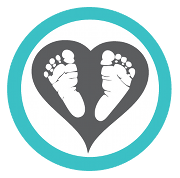Triploidy is an extremely rare chromosomal abnormality. It is caused by the presence of a complete extra set of chromosomes. It is suspected to occur in 1-2% of all pregnancies.
We had never heard of Triploidy before July 10, 2010. The diagnosis devastated our entire family. On July 7, 2010 we had visited a maternal fetal medicine specialist to have our anatomy scan. We had already had an NT scan in June. That sonogram and blood work did not reveal any concerns. At the time our little one did measure one week behind. The doctor had told us this was common and he was not concerned. One month later, our world was forever changed. During the anatomy scan the doctor started with our little ones' brain and noted that there was some fluid there. He moved down to the face and said there wasn't a cleft lip and then moved to her hands. He couldn't get a clear picture of her hands so he looked at her feet. She had the cutest little feet and I remember the doctor saying it is definitely a girl! He had thought the wee one was a girl at the last sonogram and I was beyond excited! He went back to her hands and that is where he said he had some concerns. He couldn't get her to open her hands and move her fingers individually. He told us he thought her fingers were webbed. The doctor also took measurements on her stomach and femur. Once again those she was measuring behind. An amniocentesis was done and we had to wait 48 hours for the diagnosis. The doctor had suspected trisomy 18, but we found out with one phone call that our little girl had triploidy.
To help understand triploidy, it helps to understand the make up of a healthy baby. In a healthy baby, the baby gets 23 chromosomes from the mother and 23 chromosomes from the father. They combine to give the baby 46 complete chromosomes.
With triploidy, a baby inherits 46 chromosomes from one parent and 23 chromosomes from the other parent. This give the baby a total of 69 chromosomes. This can occur in 2 different ways. The most common occurance is the egg being fertilized by 2 sperms. The other occurs when the egg does not divide properly.
Image from http://ghr.nlm.nih.gov/
In meeting with doctors and also reading as much as we could, we came to understand that triploidy is a random occurrence. It does not have to do with the mother's age nor is it genetically inherited from either parent. That being said I have read online of mothers that have had mulitple triploidy pregnancies.







